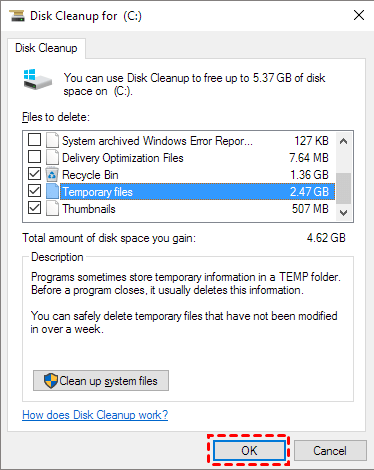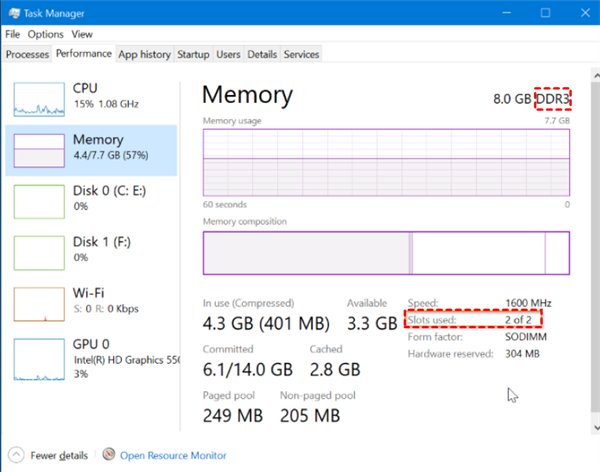Over time, your HP computer may slow down due to various reasons. Don’t panic! This post will show you how to make your HP laptop faster.

HP laptops are a popular choice for many users. However, they may slow down due to various reasons as time goes on, impacting your work process. How to make an HP laptop faster? Before diving into it, it is essential to know why your device slows down. Here are several common causes:
► Hard drive is full. (especially on the C: drive).
► Too many unnecessary files and programs
► Insufficient RAM
► Infected by viruses and malware
► Fragmentation on HDD
This section lists three effective ways to manually speed up your laptop. Continue reading to determine the option that is most appropriate for your requirements.
Over time, many unnecessary files or programs are accumulated on your laptop, taking up significant space and burdening your device. This issue can be resolved by regularly cleaning up disks and deleting unnecessary files. To free up disk space, implement the subsequent procedures:
Step 1. Press Windows + S and type disk cleanup in the search box.
Step 2. Select a drive that you want to clean up and click OK.
Step 3. Tick the files to delete and click OK to start the cleaning process.

The computer uses RAM to temporarily store running programs and processed data. If there is not enough RAM, the system will force some background programs to close or use virtual memory, resulting in slower operation. Here’s how to make an HP laptop faster by adding RAM to it:
Step 1. Press Ctrl + Shift + Esc to open Task Manager.

Step 2. Click Performance to see the current memory type and number of used slots.
Step 3. Prepare compatible RAM based on determined specifications.
Step 4. Install the new RAM chip into an available slot on your computer.
Sometimes, your HP laptop slows down because it has been infected by viruses and malware, which may cause irreparable damage to your hard drive or system. Therefore, it is advised to install professional anti-malware tools and enable security scans regularly. Here’s how to scan and remove viruses and malware using Windows Security:
Step 1. Press Windows + I to open the settings interface.
Step 2. Navigate to Update & Security > Windows Security > Open Windows Security.
Step 3. Select Virus & threat protection and then click Scan options.
Step 4. Choose a scanning method that meets your requirements, and then click Scan now to initiate the process.
AOMEI Partition Assistant is a professional partition and disk tool compatible with Windows 11, 10, 8.1, 8, and 7. It includes various features to simplify the disk partition management and improve device performance, such as cleaning PCs, cloning SSD to HDD, and resizing partition.
Compared to other tools, AOMEI Partition Assistant offers a user-friendly interface that facilitates a seamless process. This tool can assist in the effortless resolution of any problems that your system may encounter. Feel free to download it from the link provided and give it a try!
“How do I speed up my HP laptop using AOMEI Partition Assistant? For instance, you can allocate free space to the system drive. When the C: drive is running out of space, the system performance tends to slow down. Fortunately, AOMEI Partition Assistant can help you reallocate unused space from one partition to another partition. Here are detailed steps:
Step 1. Launch AOMEI Partition Assistant; then right-click the partition with sufficient space and select Allocate Free Space.
Step 2. Specify the amount of space you want to reallocate and click OK. For instance, transfer 50GB of storage capacity from the D: drive to the C: drive.
Step 3. Go back to the main interface, where you will see that the C: drive has been expanded and the D drive has been reduced.
Step 4. Click Apply and Proceed to confirm the operation.
Additionally, you can also defrag the disk to optimize your system performance. AOMEI Partition Assistant allows you to analyze disks and defrag them as needed. Follow these steps to defragment the system drive using AOMEI Partition Assistant:
Step 1. Launch AOMEI Partition Assistant; then right-click the partition that you want to defragment and select Disk Defrag.
Step 2. Click Analyze to check your partition. If you skip the Analyze and click Defrag directly, the program will still analyze the partition first.
Step 3. Wait for the analysis process to complete. There are three results:
Step 4. If you want to know more about the analysis results, click Details. Or directly click Defrag to defrag your disk.
Step 5. After the defragmentation is completed, the partition will be scored according to the defragmentation result.
It is frustrating when a computer's performance slows down over time. Wondering how to speed up your HP laptop? Take it easy! This post provides a guide on how to make an HP laptop faster. By following the methods and tools outlined, you can resolve potential issues and optimize your system's performance with ease.